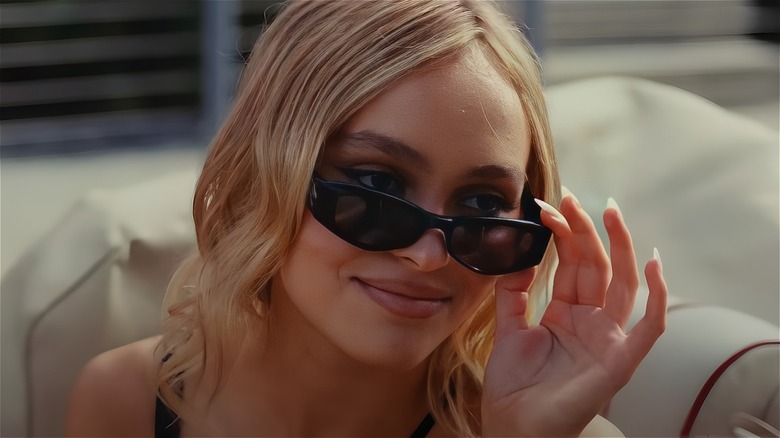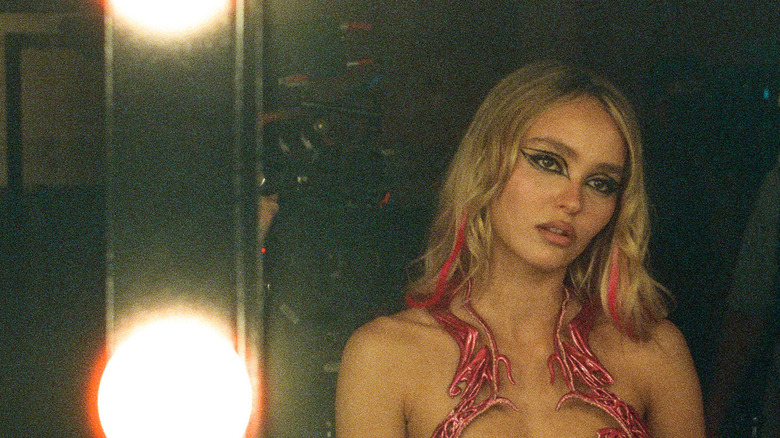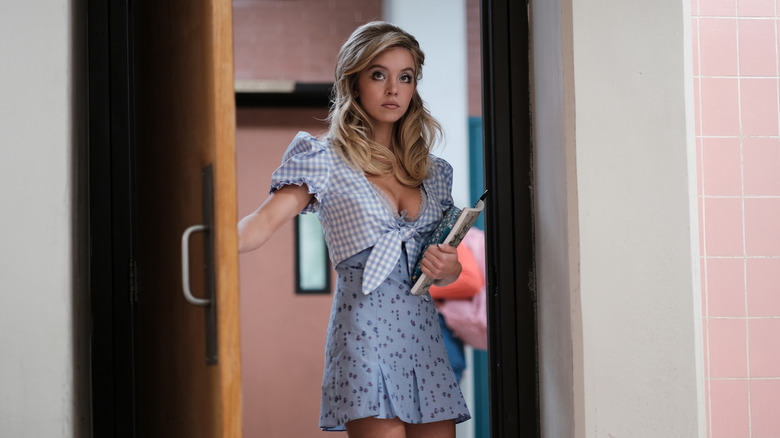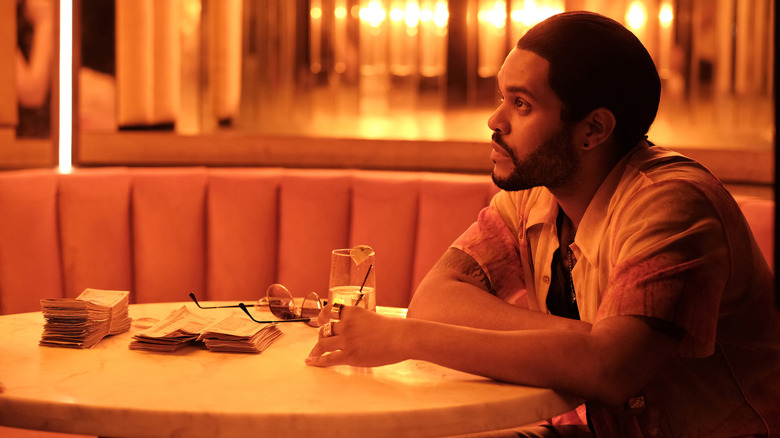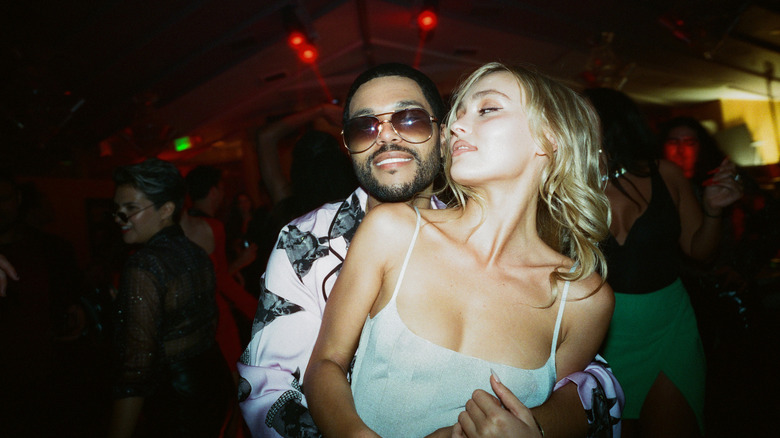The Idol Wants To Critique The Exploitation Of Pop Stars - But Revels In It Instead
If you've seen anything by Sam Levinson, you know two things to be true: he's not known for his subtlety, and he loves shock value more than almost anything. "Euphoria," his flagship show on HBO, made headlines the second it hit the small screen thanks to the way it painted today's teens as sex-crazed, drug-addled people who spend most of their time snorting ketamine rather than going to class. "Malcolm & Marie," a movie he made with his "Euphoria" muse Zendaya, drew criticism for being, well, a movie about a filmmaker complaining about criticism.
However, we're not here to relitigate the largely forgotten "Malcolm & Marie" or even "Euphoria," which might end up featuring a bunch of 40-year-olds by the time Season 3 actually resumes filming. No, we're here to talk about Levinson's new lightning rod, "The Idol," advertised as from the "sick and twisted minds" of Levinson himself and musician turned "actor" Abel "The Weeknd" Tesfaye (there is some truth in advertising). Levinson loves making a statement, and the statement he wants to make with "The Idol" is wildly transparent: fame can be a drug, and when you're a young woman in the public eye, people will manipulate you for their own gain while potentially forgetting about your humanity.
Another writer-director might have been able to make this concept really work. That person isn't Levinson. "The Idol" desperately wants to make a statement about exploitation, but it just revels in its own exploitation instead.
The titular idol on The Idol is nothing more than an empty vessel
It feels like we've seen a million versions of Jocelyn (Lily-Rose Depp) before, and that's because we have. As the series opens, she's a pop star who we're told is massively successful and one of the biggest acts in the world, despite that she's barely been releasing any commercially successful music amidst a mental breakdown brought on by the stresses of fame and death of her mother. Depp does her best with what she's given, but it's barely anything, despite the fact that the camera is constantly zooming in on her face and body to present her as an object of desire, something to be envied and taken. Jocelyn is just kind of ... there, whether she's demanding that she be able to show her bare breasts at a photoshoot, asking her team to approve a new cut of her upcoming single with moaning sounds laid over the music, or smoking (she's almost always smoking).
Jocelyn essentially just hurts herself — she cuts her inner thighs with a glass, and then pushes herself during a music video shoot to the point where she collapses on bleeding feet — and is preyed upon by men and the people in her immediate orbit. Her best friend-slash-assistant Leia (Rachel Sennott, one of the show's only redeeming qualities) and her co-manager Chaim (Hank Azaria) profess to love her, but it's pretty clear that, above all else, they love what Jocelyn represents to them: power and financial success. Jocelyn is a complete blank slate, perhaps because Levinson has trouble inhabiting her mind.
Sam Levinson's issues with female characters predate The Idol
"But wait!" you might say. "The show has only aired two episodes! Jocelyn could really develop as a character throughout the first season!"
That's a very nice thought, but we are, once again, talking about Sam Levinson here. Based on "Euphoria" — a show whose legacy "The Idol" is not helping – it's probably only going to get worse.
With the exception of Zendaya's Rue — a character whose struggles with addiction are based on Levinson's own — he is uniformly terrible at writing female characters. Even when he manages to strike gold sometimes, he'll eventually circle back around and turn the character into the cardboard cutout he apparently envisions. Take Cassie Howard from "Euphoria," played by the extraordinarily talented Sydney Sweeney, who showed real depth in the show's first season; through her backstory, Cassie's whole deal made sense as she sought companionship from men to replace her absent father. By Season 2, any trace of character development for Cassie was firmly in the rear view, and after deciding she was madly in love with her best friend's ex-boyfriend Nate Jacobs (Jacob Elordi), that one thing became her entire personality.
There are other examples of this; Barbie Ferreira was reportedly so upset by her character Kat's arc that she actually left the show. The point is, none of this bodes well for Jocelyn, for reasons that should be obvious.
So far, The Idol keeps telling us what it is instead of showing it
There's a classic writing adage about how you should show, not tell, and anyone reading this who ever took a single writing class is rolling their eyes right now. "The Idol," though, might be one of the clearest examples of how telling instead of showing makes for a shoddy product. Remember how we mentioned that Jocelyn is a shell of a person? Well, she also has problems, and every character who isn't Jocelyn loves to repeat that, ad nauseum. Her mother died of cancer right in front of Jocelyn. Her tour was canceled. She spent time in a mental health facility (charmingly, that last fact is driven home by Jocelyn sporting her hospital bracelet during that opening photoshoot).
Levinson's whole thing here is, quite obviously, that people in enormous spotlights like Jocelyn can often be battling with their own private demons, and that her level of fame can be extraordinarily difficult to handle. We get it, though. Even Talia (Hari Nef), the Vanity Fair reporter who is only just meeting Jocelyn, chimes in to remind both the audience and other characters that Jocelyn is suffering, which does nothing more than bonk the viewer over the head with this information yet again. As Jocelyn's other manager Nikki (Jane Adams) puts it, though, "Mental illness is sexy" — illustrating that when the dialogue stops being unsubtle, it's just crappy and offensive.
At its worst, The Idol is just pure exploitation — not a statement on the concept
All of these factors reach an unfortunate boiling point during the series' second episode, "Double Fantasy," where Jocelyn and the mysterious, apparent cult leader Tedros (Tesfaye, who can't act) consummate their intense attraction. The less that's said about the scene, the better, but suffice to say that it's about Tedros' pleasure and certainly not Jocelyn's, much as she might like to believe that it's all about her. Tesfaye's bizarre, deadpan line delivery doesn't help, and ultimately, all the scene does is put Depp's body on display for effect.
The way the camera lingers on Depp's body, whether she's writhing with "pleasure" for Tedros' benefit or waking up in bed completely nude, is a classic example of the "male gaze" theory pioneered by film scholar Laura Mulvey. It's constant, it feels violating, and it's unflinching. Presented with this take, Levinson would probably say that's the point and that he's critiquing exploitation; too bad he's actually doing the exact thing he's critiquing.
"The Idol" was famously plagued with behind-the-scenes drama that included director Amy Seimetz leaving the production, and without her, the show has simply become another Levinson joint — namely, a show written about a woman by men, for men. One can only hope that it doesn't continue on forever, that Depp can book a better project, and that Tesfaye can return to music and give up on the whole acting thing.
